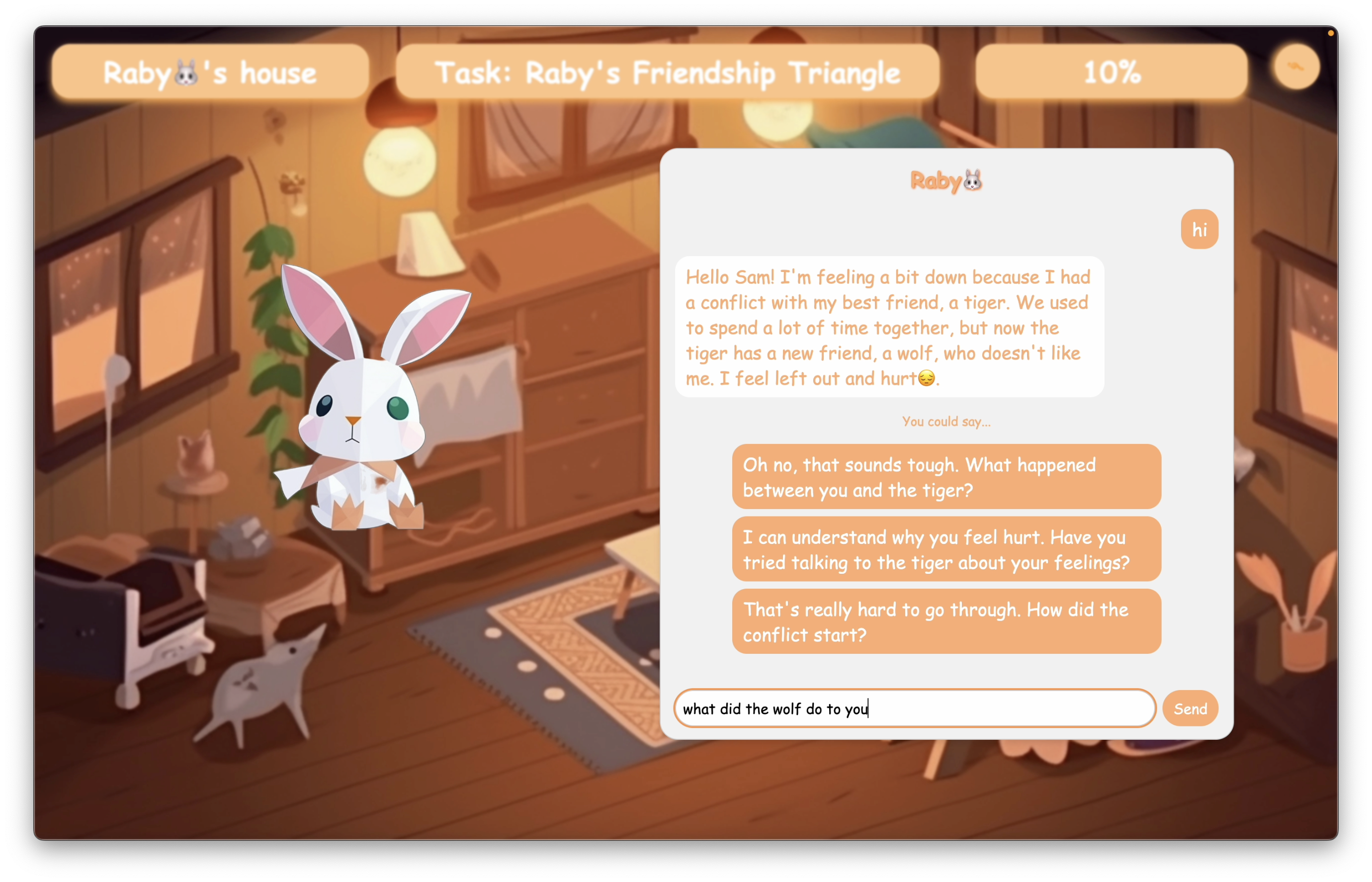Petgame Powered By Gpt4
PetGame powered by GPT4
🐾 PetGame (click me to play online!): A Virtual Friend for Addiction Recovery 🌈 Watch Demo here!
Welcome to PetGame Raby🐶🐱🦊, a virtual pet game designed to support young adults (ages 20-25) in their substance abuse recovery journey! By caring for an adorable virtual pet 🐾, users develop empathy, self-care awareness, and essential skills to overcome addiction challenges.
🔬 Our goal is to bridge the gap between clinical care and daily life, making recovery support accessible and engaging. We utilize cute pet avatars, interactive storylines, and AI-powered pet conversations 🤖💬 to create a personalized experience that encourages daily engagement.
🎮 As users help their virtual pets, they also learn to care for themselves 💞. Our app features daily self-assessments, easy access to support, and a rewarding game experience that helps develop self-awareness and self-care skills. 🌟
🌱 Join the adventure and grow together with your virtual pet as you overcome obstacles and build a brighter, healthier future! 🌈🌤️
💌 Created with love by Chenran Ning (cn257@cornell.edu) built in svelte. If you like this project, buy me a coffee!
Problem Definition
The primary challenge addressed in this project is the insufficient accessibility and continuity of care for young adult substance abuse patients between the ages of 20-25, who are undergoing treatment at levels 2.5 to 3.1 (according to the ASAM levels of care). This lack of continued support often leads to high relapse rates, as 90% of discharged patients do not receive adequate post-treatment care.
Product Vision:
Our vision is to develop a mobile app featuring a medical-use virtual pet game that can be utilized during early hospitalization and continue to provide care after discharge. By leveraging a user-friendly interface, engaging storylines, and interactive elements, we aim to promote empathy, self-care awareness, and evidence-based strategies that support patients in their recovery journey.
Project Idea:
The proposed medical-use virtual pet game feature captivating content, such as cute pet avatars, that encourage daily patient engagement. The app enables patients to perform daily self-assessments and decrease the distance between them and their respective clinics. Users are able to reach out for support easily through the app, as they experience the recovery process alongside their virtual pets. By caring for their virtual pets, patients develop the skills necessary to care for themselves.
The game incorporates features such as text-based interactions with the virtual pet, using advanced AI technologies like ChatGPT to create dynamic, personalized conversations. The game also offer a rewarding and engaging experience that ties in with the patient's reality, helping them develop self-awareness and self-care skills.
We envision our target users dedicating at least 30 minutes daily to the app, engaging in self-assessments and caring for their virtual pets through various in-app actions.
Game Plot
Upon registering, users receive a virtual pet. The pet is unable to fit in its social environment due to its inability to care for itself. Users then embark on a journey with their virtual pets, overcoming obstacles and challenges as they grow and learn together. By nurturing their pets with love, users gradually develop the skills needed to overcome their addiction.
Considerations for Target Audience:
When designing the app and addressing the needs of patients at ASAM levels 2.5 to 3.1, we carefully consider the specific challenges faced by this group. We adapt the app's content, user experience, and support mechanisms to cater to their unique requirements, ensuring that the app effectively aids them in their recovery journey.
Appendix:
The ASAM levels of care include:
- Level 2.5 is partial hospitalization, which is at least 20 hours a week but is less than 24-hour care. This level of care provides structure, and daily oversight for people who need daily monitoring, but not 24/7 care.
- Level 3.1 is clinically managed low-intensity residential treatment. Residential services at this level consist of a setting, such as a group home, where people live. However, treatment is only required to be 5 hours per week, which helps people with such topics as relapse management.
More information:
- Build in Svelte
- Chatbot supported by openai
- Images generated by Midjourney
